- Home
- Grace Callaway
The Return of the Duke Page 11
The Return of the Duke Read online
Page 11
“That doesn’t change the fact that I ain’t right for you,” she said, her voice thick with emotion. “Not two weeks ago, you wanted Bea because she’s a lady. You never even noticed me.”
“I noticed.”
His eyes were still heated, but now in a different way. And the memories of their passion came rushing back, weakening her knees and her resolve. But she couldn’t let herself weaken; she had to end what never should have begun.
“You…you didn’t want to kiss me,” she blurted.
She didn’t mean for it to sound like an accusation. He bit out an oath, the vehemence of it surprising her. For an instant, she glimpsed beneath his veneer of ruthless restraint: a hot-blooded man stared back at her with hunger and strange torment.
“It is not a question of wanting.” His voice had a guttural edge.
Why else wouldn’t he kiss her? She drew herself up. “You needn’t make excuses. I know that I’m not the sort o’ female you want for a wife.”
“Damnit, Fancy. This isn’t about you; it is about me and my situation.” He exhaled. “There are things I need to tell you so that you fully understand what I’m offering you.”
“You don’t ’ave to offer me anything.”
“Christ, are you always this stubborn?” He dragged a hand through his hair, a gesture of male frustration that she hadn’t seen from him before. “Will you do me the courtesy of listening to what I have to say? What I have never told anyone else?”
Curiosity punctured her shield of pride. Stiffly, she nodded.
“Thank you.” His gaze lowered briefly before meeting hers. “The reason I didn’t kiss you was because of a promise I made years ago. To a lady. I gave her my vow not to kiss anyone else.”
A sudden throbbing filled Fancy’s ears. She remembered the bright yearning in his eyes that instant she’d caught him unawares staring over the pond.
“Who…who is she?” she asked in a scratchy voice.
“Her name is Imogen Hammond. I met her when I was fifteen and she was thirteen,” he said gruffly. “Well, not met exactly—I pushed her out of the path of a runaway carriage. Her family was grateful, and her father hired me on. As the stable boy I did not socialize with the family, but Imogen was kind to me. She would sneak out to see me…and eventually we fell in love.”
Fancy felt disoriented, as if she were awakening from an episode of sleepwalking. Far from being a cynic about love, Knight did indeed have a romantic story. One in which the part of the princess was played by Imogen Hammond. Even the lady’s name was beautiful.
With dread and anticipation, Fancy asked, “What ’appened?”
“Nothing at first. I knew that her papa would never allow her to wed the stable boy. So I set out to better myself and earn my fortune. I quit the Hammonds and found work as a guard-for-hire. Easy money if you’re willing to risk your neck.” Knight shrugged, as if it meant nothing that he’d risked his life to win the woman of his dreams.
It ought to have been difficult for Fancy to imagine the duke in front of her working as a bodyguard. Yet she’d always sensed his primal power, which came not from wealth or position but from a deeper essence. The background he’d shared explained much: he was a man who’d literally fought for his success.
“A couple of years into that line of work, I saved a client’s life,” he went on in the same matter-of-fact manner. “The client, James Hessard, owned a number of manufactories, and he repaid me by offering me a job as his right-hand man. Hessard mentored me in the trade, and I eventually became a partner. When he retired, I bought him out and expanded the business. By the time I was five-and-twenty, I was a rich man, but it wasn’t enough. Imogen wed someone else.”
“Who?” Fancy asked even though it wasn’t any of her business.
“The Earl of Cardiff,” he said tonelessly.
“I’m sorry, Knight.”
“You have no reason to be. Imogen was a dutiful daughter who could not disobey her family’s wishes. She’s been married five years now; she and Cardiff have two children.”
Despite Knight’s neutral tone, there was a faraway look in his gaze. Empathy and yearning fell like pinpricks upon Fancy’s heart. He was as steadfast and loyal as any knight of old. For five years, Imogen had been married to another, and Knight still saved his kisses for her and her alone.
Fancy remembered what he’d said about love being a gamble, how it was better not to take the risk. Now she understood why he believed this to be true: he had taken the risk, and his heart had been smashed to smithereens.
“Do you…still love her?” Fancy said haltingly.
“Is it love? I no longer know. At times, what I feel for her seems like a habit I cannot break.” His smile held no mirth. “None of that matters. Imogen is wed, and she would never betray her husband, nor would I want her to. But I gave her my promise as a gentleman not to kiss another, and I have kept it.”
Fancy’s chest wrenched at the terrible beauty of his vow.
“You’re an honorable man,” she whispered.
“Not where you are concerned.” He inhaled, then asked, “Why didn’t you tell me that you were a virgin?”
Startled by the question, she said, “I, um, didn’t think you needed to be told.”
“Well, I did. If I had known, I…” He frowned and went on abruptly, “That day, by the stream. You told me you were experienced. You said, I know what love is.”
“I remember,” she said, thinking back. “We were talking about love, and you were being…well, you expressed a cynical view o’ it. When I disagreed, you said it was because I didn’t ’ave enough experience o’ the world. And I replied that I was experienced because I am. I’ve been travelling all my life, seen more o’ the world than most women my age, I reckon.”
“That is what you meant by being experienced. That you’d gone on the road?”
“Aye,” she said, puzzled by his incredulous tone. “And I said I know what love is because I do. My da and ma were devoted to each other. And so are Mr. and Mrs. Taylor and plenty o’ other folks I know. What else could I ’ave possibly meant?”
Knight regarded her in stony silence.
It dawned upon her. Why didn’t you tell me you were a virgin? The only reason he would ask such a question would be if he thought she wasn’t chaste.
“You thought that I…I’d been with others?” she asked in a painful whisper.
His gaze brooding, he gave a slow nod.
Hurt rose within her, bringing a flood of memories. All the people who had looked down upon her because she was a tinker’s daughter. The men who’d tried to take advantage because they’d assumed she had no morals or pride. The nasty assumptions folks made about her and her kin.
Over the years, she’d built walls to block out the pain. But now those very walls—her treasured dreams—were turning against her. She’d steeled herself to accept that there was no future with her prince, no faerie tale ending. She could even bear the pain of knowing that he loved another, if only because it spoke of his devoted heart.
She was not prepared for him to think so shabbily of her.
To think that she was…a trollop.
Bea was right, she realized numbly. He only wanted one thing from me. What happened wasn’t magical, it was cheap.
“Fancy, I’m sorry. Please don’t cry.”
His jagged words sliced through her daze of pain. She hadn’t realized that she was crying. Mortified, she turned away from him, wiping her apron over her eyes, catching the tears she couldn’t stop.
“Just go,” she said in muffled tones.
“I am not leaving you.” Suddenly, he was behind her, turning her around, his arms surrounding her tightly. “God, I’m such a bastard.”
His gruff admission unraveled her. She pounded at the cage of his strength, venting her anger at him. He didn’t stop her and didn’t let her go. He just held her until she stopped fighting and wept. For her broken dreams and lost innocence. She cried, soaking his waistcoat, his
hand stroking soothingly over her back. Finally, all she had left were shuddering breaths.
Then Knight spoke, his voice deep and gravelly beneath her ear.
“I cannot apologize enough for what I believed,” he said. “Growing up a poor and fatherless urchin in the rookery, I, of all people, know what it is like to be judged for one’s origins. How unfair and hurtful it feels. I have no excuse for doing that to you.”
In her present state, there were few things he could have said to reach her.
Just then, he’d said them.
His exquisite understanding of her pain was almost as astonishing as what he had revealed about himself. During their journey together, they had discussed varied topics, from his work to his siblings, but the one thing he’d avoided talking about was his own origins. He’d said next to nothing about his mother or his childhood.
She raised her head from his chest. “You grew up poor and fatherless?”
“I didn’t know the identity of my father until a year ago,” he said steadily. “My maman wouldn’t talk about it, just told me that he’d died before I was born. I suspected I was a bastard. She worked as a seamstress, barely earning enough for us to survive. I stole, fought, did whatever I could to help put food on our table. She died when I was twenty, and for all the time I knew her, she never had an easy life.”
Fancy didn’t know what to say. Even though she knew he had a rags-to-riches story, she hadn’t realized that his rags were, well, actually rags.
He took out a handkerchief, drying her tears as he went on, “Last year, I was summoned to the deathbed of Arthur Huntingdon, the Duke of Knighton. For reasons too lengthy to get into now, he told me that he’d abandoned my mother, but they had been legally wed. Which meant that I was his legitimate issue and sole heir.”
“That must ’ave been shocking,” Fancy said, wide-eyed.
“To say the least.” He cupped her cheek in his big hand. She knew she ought to pull away, but she was mesmerized by his warm and smoky gaze. “I’m telling you my history because I want you to understand that I have never thought you were beneath me in any way. If anything, you are too good and sweet for a man like me. You deserve a fellow who can give you all of his heart, and I cannot do that. But I have other things to offer, if you’ll do me the honor of listening to my proposal.”
His thumb brushed briefly along her cheekbone before he let her go. He waited silently, his hands clasping behind his back, his manner watchful.
Tell ’im to leave, the voice of reason said. Don’t let ’im ’urt you again.
Alas, her heart had never been sensible.
“What are you offering?” she asked.
He let go of a breath that she hadn’t realized that he was holding. The fact that he obviously cared about her response lowered her defenses a smidgen more.
“I am not a prince, but I do have a castle,” he said intently. “Several, actually, if run-of-the-mill mansions count. If not, there are a pair of chateaux in France we could visit any time you want. You said you wanted a place to settle, and I can give you that.”
‘E remembers, she thought wonderingly. ’E paid attention to the details o’ my foolish dream.
“I can also give you a family in the form of four half-siblings and an aunt. I must warn you however: when you meet them, you will likely wish to give them back.”
His wry humor caught her off-guard, and she gave a watery chuckle.
“They can’t be as bad as all that,” she said.
“They are worse. But if you want to take them on, they’re yours.”
As she mulled over that, he cleared his throat. “They are, of course, not the only family I could give you. That I would wish to give you, if you were my wife.”
Her pulse skipped at the heated look in his grey eyes.
“I want you, Fancy,” he said huskily. “While desire is not the same as love, I still say it is the more reliable of the two. And what I feel for you is not just physical attraction. I like you.”
He wants me. He likes me.
Thrill tip-toed up her spine; she halted it.
“What do you like about me?” she asked cautiously.
“I like that you are easy to talk to. That you’re caring and loyal to your family and friends. I like that you’re honest and practical, that you’re not one of those milk-fed misses prone to bouts of silliness.”
She blinked at the readiness of his reply. She had no idea that he thought these things about her. And there was more.
“I like that you care about cantankerous donkeys, that you don’t back down to fish bigger than you are.” A smile lurked in his eyes. “I like that you’re constantly getting into trouble so that I can come to your rescue.”
“I don’t constantly get into trouble,” she protested.
He raised his brows.
Sighing, she amended, “Although, o’ late, it ’as been finding me.”
“It is a fortunate thing that you have me around,” he said and chucked her under the chin.
The casual, affectionate gesture was the nail in the coffin of her resistance. Although Knight didn’t promise her love, it seemed that he could give her the other parts of her dream. That he wanted to.
Maybe he was right. Maybe love wasn’t as important as she thought it was. Maybe passion and friendship were dependable bricks with which to build a marriage. As she tested letting go of some of her old expectations, she found there was one she couldn’t relinquish.
“What about Imogen?” she forced herself to ask.
“She will have no bearing on our marriage.” His expression was grave. “I give you my promise to be a good and faithful husband. I won’t lie to you, and I ask that you return the courtesy. The fact that we can comfortably discuss Imogen is a good sign, I daresay, of the honesty that is possible between us. Of our ability to communicate and work together as a team.”
He was so convincing, even when she knew their path wouldn’t be easy. In truth, she didn’t know what lay ahead. Yet if she had any talent, it was this: she was good at adapting and making the best of what she had. Rarely in her life had she been given anything whole or perfect. Right now, she had a handsome duke who desired and liked her, who wanted to give her a home and a family.
How much more could she ask for?
“Say you will be mine, Fancy,” he coaxed. “Say you’ll build a future with me.”
“I will.” She released a breath. “On one condition.”
She was an optimist, but she wasn’t stupid. She learned from her past mistakes. If she was to venture into uncertain territory, she would take measures to protect herself.
The softness left his eyes, his mouth taking on an oddly cynical bent. “Name your terms.”
Since there was no delicate way to put it, she said in a rush, “I don’t want you to kiss me.”
She didn’t think Knight could be taken aback, but his slackened jaw suggested it was possible.
“May I ask why not?” he asked with obvious care.
“Because you don’t want to,” she said frankly. “And I don’t want to be kissed unless you mean it.” Unless you love me. “I ’ave my pride too, Knight.”
“I never doubted that.” He cleared his throat. “What about…other marital activities?”
Her cheeks flamed, but she said steadily, “As you said, we desire one another, and there is nothing dishonest in acting on those feelings. I want to be a true wife to you, Knight.”
“I am glad to hear it,” he said softly. “Because I mean to be a true husband to you.”
He cradled her jaw, leaning in. When his lips brushed tenderly against her forehead, she trembled. And prayed that she had made the right choice.
13
Two mornings later, Severin awaited Fancy in the blacksmith’s shop in Gretna Green.
Although the place hadn’t been used as a smithy in probably decades, the low-ceilinged room still bore the faint scent of smoke and heated minerals. The whitewashed walls and bouquets of loc
al flora signaled the room’s current use as a wedding venue. Severin maintained an aura of calmness as the blacksmith “priest,” a Mr. Clewis, puttered impatiently by the anvil over which the marriages were conducted. Twice, Clewis had asked when the bride-to-be would arrive as he had several weddings scheduled for the day.
Severin had shut the man up with coin. Yet he couldn’t stem his own unease that Fancy might not show. What were the odds that he would be stood up not once, but twice for an elopement?
Granted, things hadn’t gotten this far with Imogen: they’d never left London, for she’d failed to show up at their appointed meeting place. He’d planned to take her here, to Gretna Green, a village just past the border of Scotland that was famous for its trade in expedient marriages. As Scotland’s marriage laws were less restrictive than English ones, Gretna had become a favorite destination for English elopements. Blacksmiths could legally carry out the ceremonies, officiating what were popularly known as “anvil weddings.”
Severin and the Sheridans had arrived yesterday in the late afternoon. Although Severin wasn’t eloping with Fancy, he did want to bind her legally to him as soon as possible. He’d booked an appointment at the blacksmith shop for ten o’clock sharp this morning, and Fancy was a quarter hour late. He wondered darkly if her father was behind her absence.
Sheridan had insisted that Fancy spend the night in the family wagon rather than at the inn where Severin had booked out an entire floor of rooms. For reasons that Severin frankly could not fathom, the tinker remained staunchly opposed to the union. Severin was prepared to take whatever steps necessary to gain the man’s acquiescence, if not approval, but Fancy had precluded his interference.
“Leave Da to me,” she’d said firmly. “I’ll see you at the blacksmith’s tomorrow.”
Despite her delicate looks and sweet manner, his bride-to-be had a determined streak to her personality. Severin was glad for it: she would need that obstinacy when they had to face his family and the ton back in London.
If he succeeded in claiming her as his duchess, that was.

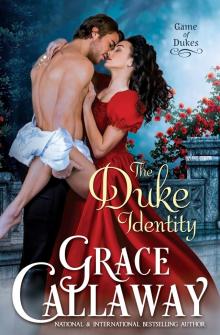 The Duke Identity: Game of Dukes, Book 1
The Duke Identity: Game of Dukes, Book 1 The Return of the Duke
The Return of the Duke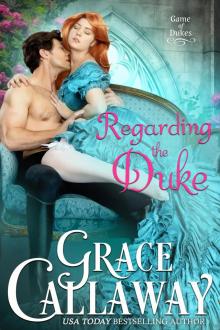 Regarding the Duke
Regarding the Duke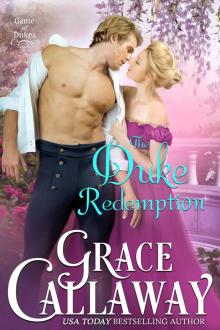 The Duke Redemption
The Duke Redemption Olivia and the Masked Duke
Olivia and the Masked Duke Abigail Jones (Chronicles of Abigail Jones #1)
Abigail Jones (Chronicles of Abigail Jones #1)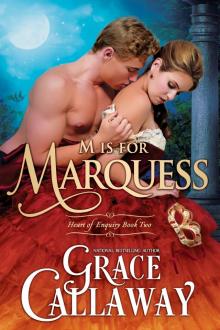 M Is for Marquess
M Is for Marquess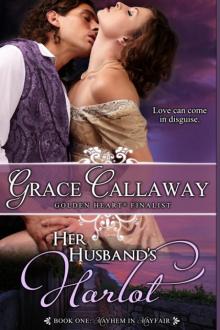 Her Husband's Harlot
Her Husband's Harlot The Lady Who Came in from the Cold
The Lady Who Came in from the Cold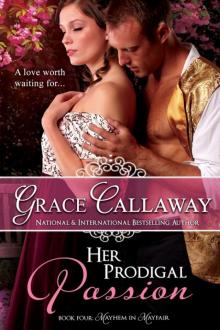 Her Prodigal Passion
Her Prodigal Passion The Widow Vanishes
The Widow Vanishes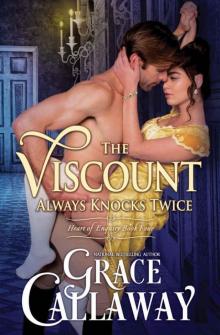 The Viscount Always Knocks Twice (Heart of Enquiry Book 4)
The Viscount Always Knocks Twice (Heart of Enquiry Book 4)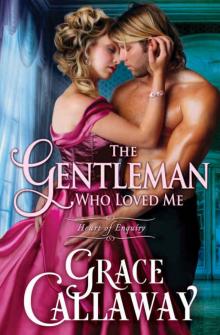 The Gentleman Who Loved Me (Heart of Enquiry Book 6)
The Gentleman Who Loved Me (Heart of Enquiry Book 6)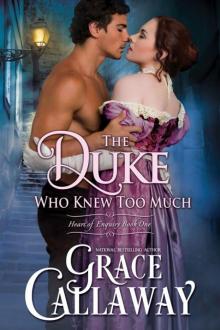 The Duke Who Knew Too Much
The Duke Who Knew Too Much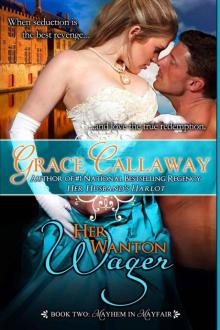 Her Wanton Wager
Her Wanton Wager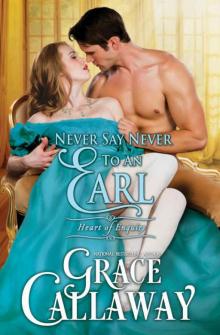 Never Say Never to an Earl (Heart of Enquiry Book 5)
Never Say Never to an Earl (Heart of Enquiry Book 5)